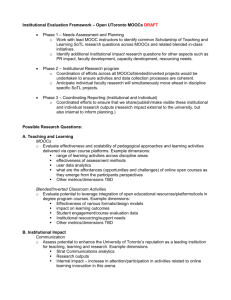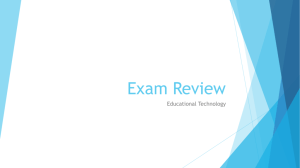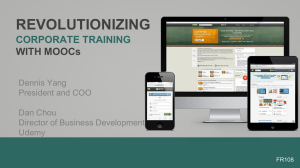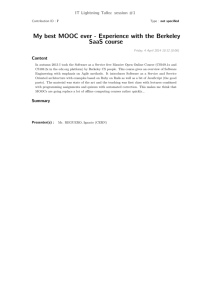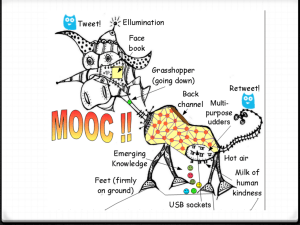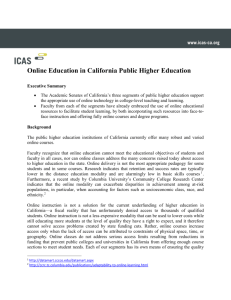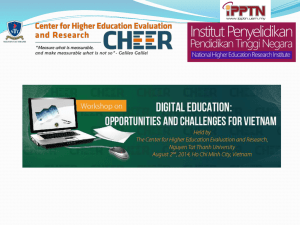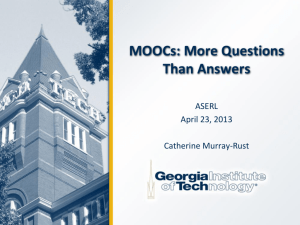MOOCs: A Campus Conversation Division of Student Affairs Monthly Meeting
advertisement
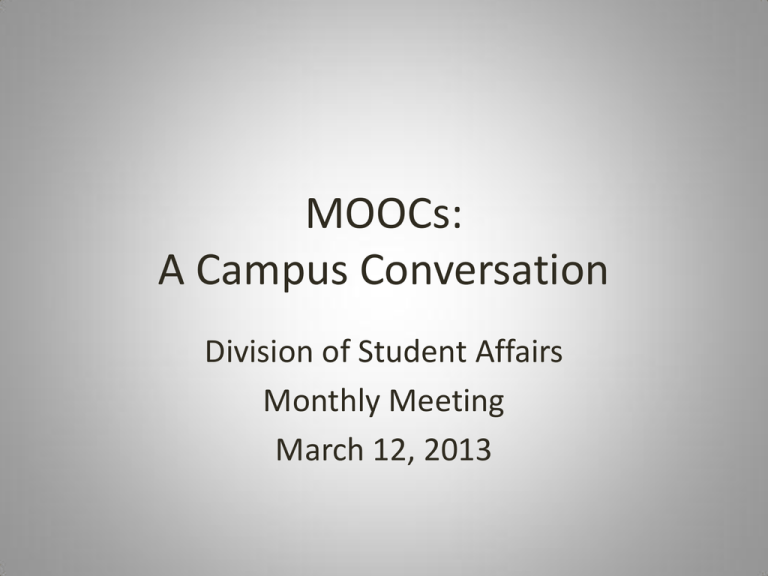
MOOCs: A Campus Conversation Division of Student Affairs Monthly Meeting March 12, 2013 So, What is a MOOC? • Stands for Massive Open Online Course • Coined by Dave Cormier 2008 • A MOOC is by itself a non-defined pedagogical format online to organize learning/teaching/training on a specific topic in a more informal collaborative way. • It is a gathering of participants, of people willing to jointly exchange knowledge and experiences for each of them to build upon. http://moocguide.wikispaces.com/0.+Home+Intro+to+MOOC MOOCs You Can Explore • • • • • Khan Academy Coursera Udacity edX ITunesU CS50x: Introduction to Computer Science HarvardX • “CS50x is Harvard College's introduction to the intellectual enterprises of computer science and the art of programming for majors and non-majors alike, with or without prior programming experience. • Online learners who achieve a passing grade in CS50x will earn a certificate of mastery that indicates successful completion of the course, but will not include a specific grade. Certificates will be issued by edX under the name of HarvardX. For CS50x in Fall 2012 – Spring 2013, certificates will be free.” https://www.edx.org/courses/HarvardX/CS5 0x/2012/about The End of the University as We Know It by Nathan Harden 1) 2) 3) 4) Higher Education is in Trouble Technology is the great equalizer Prestigious Universities Flourish The Value of MOOCs http://the-american-interest.com/article.cfm?piece=1352 “Higher Education is in Trouble” • In 50 years…. – 4,500 colleges and universities will cease to exist – Access to college will be free for everyone – Residential college campus will be obsolete – Tens of thousands of faculty will lose their jobs – Bachelor’s Degree will become irrelevant – Classroom will become virtual – Live lecture replaced by streaming video “Higher Education is in Trouble” • Internet is a great destroyer of any traditional business that relies on sales information • Persistent public faith in the value in the college degree has kept demand high but that is going to change • Biggest mistake a non-ultra-elite university can make is to spend lavishly to expand its physical space “Technology: The Great Equalizer” • Technology isn’t going away • Like online dating, online education has become the norm- not “creepy” • Students are in a golden age • Biggest barrier to mainstreaming online education is the common assumption that students don’t learn well with computer based instruction “Technology: The Great Equalizer” • Tipping point: – new interactive technology – coupled with widespread access to broadband internet service – Increased student comfort interacting online WILL SEND ONLINE EDUCATION MAINSTREAM • Changes ahead: most beneficial, most efficient and most EQUITABLE access to education that the world has seen “Prestigious Universities Flourish” • Prestigious universities with endowments will be in a position to dominate this virtual, global educational marketplace • Bottom feeders will disappear or turn into vocational training institutions • President s of MIT and Harvard have said that “online education is not an enemy of residential education” “Prestigious Universities Flourish” • Why would somebody pay tens of thousands to attend “Nowhere State University” when he or she can attend an online version of Harvard? • Elite programs that are among the first to offer robust academic programs online with real credentials behind them will be the winners in the coming higher-ed revolution “Prestigious Universities Flourish” • Harvard and MIT- certificate of masterycomplete the course and can demonstrate knowledge of course material • 60 million of their own money- edX • One potential source of cost savings for lowerrung colleges would be to draw from opensource courses offered by elite universities • Community Colleges could effectively outsource MOOCs Have Value • I-Tunes model- education for the future • Legitimacy of MOOCs in the eye of employers will grow especially as respected universities take the lead in offering open courses with meaningful credits • Great remedy to the increasing need for continuing education for non-traditional students MOOCs Have Value • Real value of MOOCs is their scalability • Universities will be extend their reach to students around the world unbound by geography or even by time zones • Offered for the fraction of the cost • Bring future students an array of new choices about how to build and customize their education MOOCs Have Value • Students could list the courses and achievements on their resumes rather than degrees and GPAs. • Demand for instructors will decline because good instructors could teach record #s • Bad instructors squeezed out • Large number of intelligent people will be freed up from teaching and will be able to do research “MOOC mania” Why the obsession with MOOCs? • Rising cost of higher education – middle-class anger over tuition costs • Affordability – State and Fed government want to reduce higher-ed spending – MOOCs are deemed affordable • Efficiency – as education systems continue to grow – MOOCs may be a way of teaching people efficiently • Online courses have the ability to reach more people – One course can reach millions of individuals worldwide • MOOC model is financially attractive – – everyone is chasing limited opportunities for high returns What do the skeptics say? MOOC proponents have created some false assumptions: 1. Students are homogeneous 2. Students are mere consumers of higher education 3. Education via MOOCs is free 4. MOOCs are accessible to everyone worldwide What do the skeptics say? • Students are not all the same – There is great variation among students and what they want • face to face interaction • cheapest education • whistles and bells – There is great variation among institutions of higher education • differentiated with various options • Students are not just consumers – also producers – develop individualized plans • Two students attending the same college will produce different educational outcomes Other considerations…. • If students are struggling to grasp the course content there is no academic support – “One widely quoted dropout figure for students in massive open online courses is 90 percent.” • MOOCs are not necessarily free – – – – – Course materials Reference materials Internet access Computer and other related technology to access course Certification fees • MOOCs may not necessarily be physically accessible – Questions of disability-related access – Only 22 out of every 100 people worldwide own or share a computer. – Everyone does not have access to: • • • • Technology Internet Computers Course materials, etc. A word of caution: • There is mounting pressure to move toward accepting MOOC credits and creating online courses • “If decision makers in higher education believe the sky is falling, they may find themselves taking actions that are value-destroying rather than value-enhancing” Suggestions: • Calm down – MOOCs will change some things and not others – Brick and mortar institutions will not disappear • Information technology will continue to advance • Financial models of universities are not based solely on undergraduate education, but on a compilation that includes: – Research – post graduate education – other sources of income Articles • Change From Within. Inside Higher Ed. March 4, 2013. By Paul Fain. • Expanding Pathways to MOOC Credit. Inside Higher Ed. February 7, 2013. By Doug Lederman. • Online Courses Could Widen Achievement Gaps Among Students. The Chronicle of Higher Education. February 21, 2013. By Jake New. • The End is Not Nigh for Colleges. The Chronicle of Higher Education. February 4, 2013. By Robert J. Sternberg. • The Higher-Education Lobby Comes to Madison. The Chronicle of Higher Education. February 20, 2013. By Sara Goldrick-Rab. • To MOOC or Not to MOOC. The Chronicle of Higher Education. February 13, 2013. By Nigel Thrift. • Udacity's Credit Path. Inside Higher Ed. January 16, 2013. By Paul Fain.
